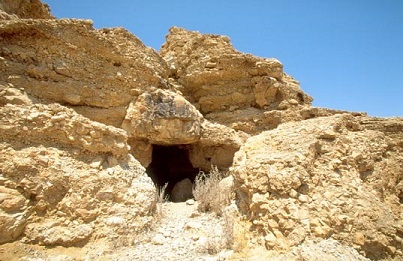Dead Sea Scrolls
- The Dead Sea Scrolls are a collection of ancient manuscripts that include the earliest existing copies of books from the Hebrew Bible, date from the 3rd century BC to the 1st century AD.
- Around 900 scrolls were discovered between 1947 and 1956 in the Qumran caves above the Dead Sea.
- Israeli scholars have recently deciphered one of the previously unread manuscripts of the Dead Sea Scrolls.
- The latest deciphered scroll contains references to the 364-day calendar used by the sect, as opposed to the lunar calendar used in Jewish religious practice today.
- It also refers to annual wine and olive harvest festivals no longer observed in Judaism.

Discovery of Ape Fossil
- Researchers have recently unearthed 11 million years old the Ape fossil in Kutch, Gujarat.
- It is the oldest and the only known ape fossil discovered in peninsular India.
- Fossils of Ape have been previously unearthed near the Siwalik hill range, spreading across Pakistan, Churia Hills in Nepal and around the Himalayas.
- But this new finding, almost 1,000 km south from the previous finds has increased the geographic range of the genus.
- Many associated mammal fossils belonging to the Miocene age have been discovered in Kutch in the past, including whales and sea cows.
- That’s the reason, Kutch is considered as a paradise for fossils.
- The new discovery will help to understand in detail the evolution of great apes.
Bioplastics
- Plastics are usually made from petroleum, with the associated impacts in terms of fossil fuel depletion and climate change.
- It is estimated that by 2050, plastics could already be responsible for 15% of the global CO2 emissions.
- Bioplastics, plant-based plastics is often considered as an alternative to petroleum-based plastics.
- They are in principle climate-neutral since they are based on renewable raw materials such as maize, wheat or sugar cane.
- Therefore, producing bioplastics consumes CO2 and their net greenhouse gas balance is assumed to be zero.
- However, a recent study found that shifting to plant-based plastics could lead to generate increased greenhouse gas emission from cropland expansion on a global scale.
Gulf Cooperation Council
- The Gulf Cooperation Council is a regional political and economic alliance of six Gulf States.
- Bahrain, Kuwait, Oman, Qatar, Saudi Arabia, and the United Arab Emirates are the member countries.
- It is headquartered in Riyadh, Saudi Arabia.
- Its aim is to achieve ever closer union between the energy rich Gulf countries.
- The 39th GCC summit was recently held in Riyadh, Saudi Arabia.
- The summit has failed to resolve a diplomatic crisis that continues to grip the region.
- Saudi Arabia, Bahrain, UAE and Egypt have imposed an air, land and sea blockade on Qatar since June 2017.
- The blockading countries has accused Qatar of supporting terrorism.
Ideate for India
- It is a national challenge to students of classes 6 - 12 across the country to give them a platform to become solution creators for the problems.
- It will help inculcate innovation skills in youth and equip all students to utilise technology for the betterment of their communities and the society at large.
- It is designed and launched by the National e-Governance Division, Ministry of Electronics & IT in collaboration with Intel India, with the support of Ministry of Human Resource Development.
Source: PIB, The Hindu, The New Indian Express
